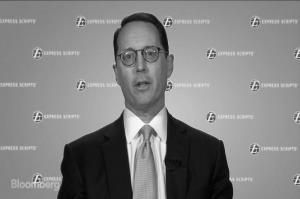Express Scripts Sells Unit With Ties To Mallinckrodt's Acthar

Mallinckrodt's (MNK) Acthar is one of the country's most-expensive drugs and Express Scripts (ESRX) has provided distribution muscle for the drug. That appears to be changing, however. Monday Express Scripts announced it was selling United BioSource, a unit tied to helping distribute Acthar:
Express Scripts Holding Co. is trimming some of its ties to a $35,000-a-vial medicine made by Mallinckrodt Plc by finding a private-equity buyer for its unit that helps patients access some high-priced drugs.
Avista Capital Partners will buy Express Scripts’ United BioSource division, the firms said in a statement. United BioSource’s website says it helps “maximize product access and commercialization,” helps drug companies “overcome access and adherence challenges” and provides drug testing services.
United BioSource also runs a program that gives away Acthar to patients who have a hard time affording it. How much in Acthar sales the unit represents is unclear.
The Situation
Per Business Insider, from 2001 to today the price of the Acthar increased from $748 per vial to $40,000. Most of those price increases came after Questcor acquired the drug in 2001. Mallinckrodt continued price increases after it acquired Questor in 2014. It likely had to in order to justify the $5.6 billion acquisition. Of the drugs reimbursed by Medicare/Medicaid it is considered one of the most expensive.
Citron's Andrew Left has criticized the drug for its ineffectiveness for illnesses outside of infantile spasms which it was originally indicated for. Earlier this year Citron suggested an alliance between Express Scripts and Mallinkrodt was helping to keep prices high for Acthar by convincing employers and insurers to pay for its use beyond infantile spasms. These claims appeared to have fallen on deaf ears. Something might have changed in Q3 2017 when sales of Acthar fell 6% Y/Y. The drug still accounts for over 35% of the company's total revenue, so as Acthar goes so goes Mallinckrodt.
An increasing number of Acthar prescriptions went unfilled which hurt sales. Market chatter suggested a larger payer put restrictions on high volume Acthar users who took the drug for pulmonary, rheumatological, neurological and nephrological illnesses. Then the other shoe dropped - Express Scripts also recommended that its clients place restrictions on Acthar for illnesses other than infantile spasms and an acute multiple sclerosis exacerbation. It gave the appearance that at least for sales unrelated to infantile spasms, Acthar's decline could be structural.
Is The United BioSource Sale A Coincidence?
I believe the United BioSource sale could be an attempt by Express Scripts to distance itself from Acthar, and could be damning for Mallinckrodt. By giving away Acthar to patients at steep discounts United BioSource gives the appearance it is helping clients afford the drug. However, these sorts of programs have also been criticized for helping steer patients to expensive, brand-named drugs rather than cheaper alternatives like generics.
They could also potentially help improve customer retention rates for expensive drugs. The higher retention rates could lead to sustained reimbursements for insurers, which inure to the benefit of Mallinckrodt and Express Scripts. Sans the assistance provided by United BioSource, Mallinckrodt might have to reduce the average sales price to entice customers to stay, or lose sales altogether. Either way it could hasten the diminution in Acthar sales.
Will Express Scripts Come Out Unscathed?
Express Scripts's mission is to help its clients keep drug prices low. United BioSource might have created a conflict of interest since it was helping drug manufacturers. Secondly, its relationship with Acthar could hurt Express Scripts's brand. Critics have been questioning Acthar's effectiveness for certain indications for years, yet only recently did Express Scripts recommend clients place restrictions on the drug. The Journal of the American Medical Association ("JAMA") recently questioned the effectiveness of Acthar for certain indications, and suggested there were much cheaper alternatives. I found this to be particularly damaging.
Express Scripts generates about $25 billion in quarterly revenue. Any hit to revenue from a decline in Acthar sales could hurt sales growth. It could also hurt margins depending on how much in kick backs it gets from distributing the drug. Express Scripts's Q3 revenue was down 3% Y/Y. Gross margin was flat but, but it cut SG&A expenses by 12% which helped spur the bottom line. The risk is that controversy over its Mallinckrodt relationship could (1) put a greater spotlight on its role in the drug price debate and (2) pressure it to potentially unwind other deals for high priced drugs.



